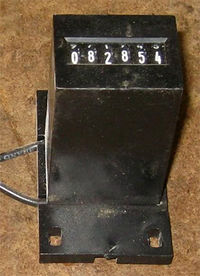Coin counter: Difference between revisions
Jump to navigation
Jump to search
mNo edit summary |
mNo edit summary |
||
| Line 1: | Line 1: | ||
[[File:Coincounter.jpg|thumb|200px]] | [[File:Coincounter.jpg|thumb|200px]] | ||
Not to be confused with the [[MV-LED|credits display]]. | |||
The | Coin counters are internal electromechanical devices used to count inserted coins in arcade cabs. They can only count up and should be made hard to reset. | ||
The counters typically have one pin hardwired to +12V, and the other one connected to the MVS board by [[JAMMA_connector_pinout|JAMMA]] pins 8 and J. They are operated by software, not directly by the coin chutes. | |||
=Control= | =Control= | ||
Only the [[system ROM]] should | Only the [[system ROM]] should take care of this. | ||
When writing to {{Reg|REG_SETCC1}} or {{Reg|REG_SETCC2}}, current flows through the counters, | When writing to {{Reg|REG_SETCC1}} or {{Reg|REG_SETCC2}}, current flows through the counters, incrementing them. When {{Reg|REG_RESETCC1}} or {{Reg|REG_RESETCC2}} are written to, current flow is stopped. | ||
[[Category:Cartridge systems]] | [[Category:Cartridge systems]] | ||
Latest revision as of 20:42, 26 December 2016

Not to be confused with the credits display.
Coin counters are internal electromechanical devices used to count inserted coins in arcade cabs. They can only count up and should be made hard to reset.
The counters typically have one pin hardwired to +12V, and the other one connected to the MVS board by JAMMA pins 8 and J. They are operated by software, not directly by the coin chutes.
Control
Only the system ROM should take care of this.
When writing to REG_SETCC1 or REG_SETCC2, current flows through the counters, incrementing them. When REG_RESETCC1 or REG_RESETCC2 are written to, current flow is stopped.